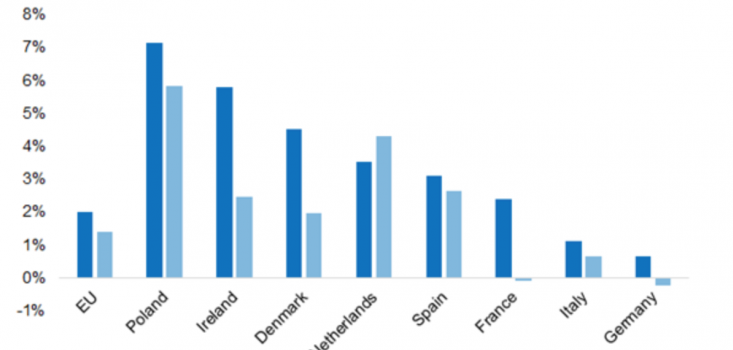The total EU pig population at the end of 2017 (excluding Bulgaria) was 2% up on the year at 149.5 million, according to the latest census results published by Eurostat.
The number of breeding sows also rose to 12.1 million, a modest increase of 1% on the year, on the back of rising pig prices in early 2017.
Of the key pig producing member states; the big increases in breeding sows were seen in Poland (6%), the Netherlands (4%) and Spain (3%). Other major producers including Germany and France all remained steady on the year. The UK breeding herd is thought to have increased by around 1% in 2017. The number of in pig-sows across the EU was stable, whereas in-pig gilts were up 2%.

According to AHDB trainee analyst Abigail Schofield, the overall modest increase in the breeding herd suggests that EU production will be above 2017 levels somewhat, boosting the availability of supplies on the market. Prices are therefore expected to be slightly below those received in 2017, when there was a Europe-wide reduction in supplies.

In terms of the total pig herd was up on the year, all the key pig producing member states increased their pig populations year-on-year, although the scale of the increase was mixed. Most notably, the Spanish pig population, already the largest in the EU, increased by a further 3%. Poland and Denmark also reported year-on-year increases their total pig herds by 7% and 4%, respectively.
A higher number of fattening pigs between 20-110kg was also reported, helping to drive the overall 2% increase in the total EU pig herd. Although many of these pigs will have been slaughtered by now, this provides evidence for reports of greater supplies coming onto the market towards the end of 2017, Ms Schofield said.
The number of piglets was 3% above year earlier levels too, suggesting that EU production has the potential to rise in the short to mid-term.
“Although modest, the pig herd is expanding, suggesting that throughputs will remain above 2017. Unless these are met by demand, the EU pig marketplace may be challenging over the next year'” Ms Schofield said.




